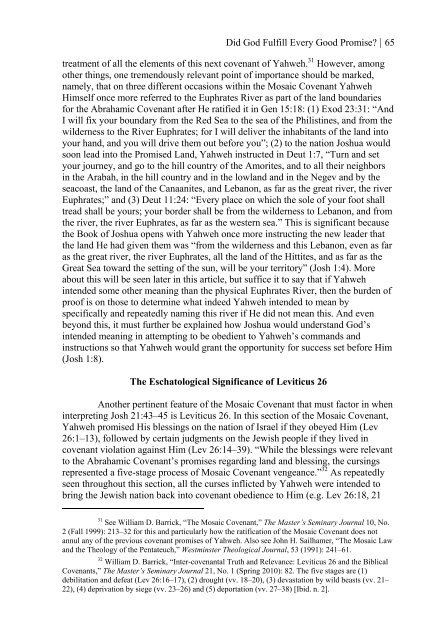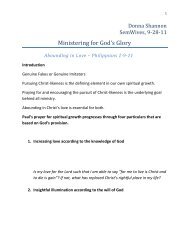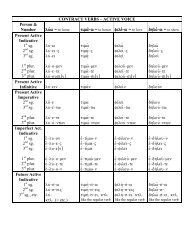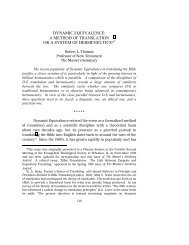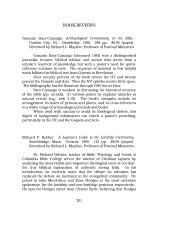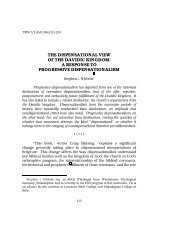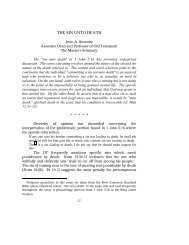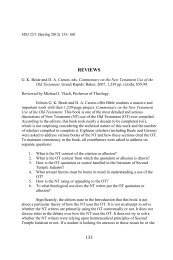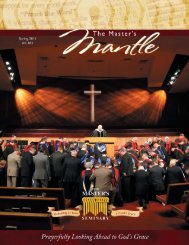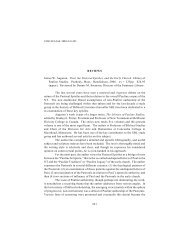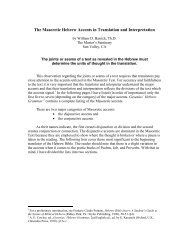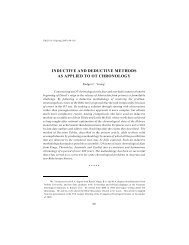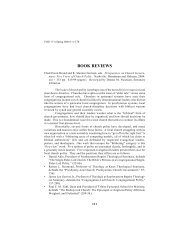Did God Fulfill Every Good Promise? - The Master's Seminary
Did God Fulfill Every Good Promise? - The Master's Seminary
Did God Fulfill Every Good Promise? - The Master's Seminary
You also want an ePaper? Increase the reach of your titles
YUMPU automatically turns print PDFs into web optimized ePapers that Google loves.
<strong>Did</strong> <strong>God</strong> <strong>Fulfill</strong> <strong>Every</strong> <strong>Good</strong> <strong>Promise</strong>? | 65treatment of all the elements of this next covenant of Yahweh. 31 However, amongother things, one tremendously relevant point of importance should be marked,namely, that on three different occasions within the Mosaic Covenant YahwehHimself once more referred to the Euphrates River as part of the land boundariesfor the Abrahamic Covenant after He ratified it in Gen 15:18: (1) Exod 23:31: “AndI will fix your boundary from the Red Sea to the sea of the Philistines, and from thewilderness to the River Euphrates; for I will deliver the inhabitants of the land intoyour hand, and you will drive them out before you”; (2) to the nation Joshua wouldsoon lead into the <strong>Promise</strong>d Land, Yahweh instructed in Deut 1:7, “Turn and setyour journey, and go to the hill country of the Amorites, and to all their neighborsin the Arabah, in the hill country and in the lowland and in the Negev and by theseacoast, the land of the Canaanites, and Lebanon, as far as the great river, the riverEuphrates;” and (3) Deut 11:24: “<strong>Every</strong> place on which the sole of your foot shalltread shall be yours; your border shall be from the wilderness to Lebanon, and fromthe river, the river Euphrates, as far as the western sea.” This is significant becausethe Book of Joshua opens with Yahweh once more instructing the new leader thatthe land He had given them was “from the wilderness and this Lebanon, even as faras the great river, the river Euphrates, all the land of the Hittites, and as far as theGreat Sea toward the setting of the sun, will be your territory” (Josh 1:4). Moreabout this will be seen later in this article, but suffice it to say that if Yahwehintended some other meaning than the physical Euphrates River, then the burden ofproof is on those to determine what indeed Yahweh intended to mean byspecifically and repeatedly naming this river if He did not mean this. And evenbeyond this, it must further be explained how Joshua would understand <strong>God</strong>’sintended meaning in attempting to be obedient to Yahweh’s commands andinstructions so that Yahweh would grant the opportunity for success set before Him(Josh 1:8).<strong>The</strong> Eschatological Significance of Leviticus 26Another pertinent feature of the Mosaic Covenant that must factor in wheninterpreting Josh 21:43–45 is Leviticus 26. In this section of the Mosaic Covenant,Yahweh promised His blessings on the nation of Israel if they obeyed Him (Lev26:1–13), followed by certain judgments on the Jewish people if they lived incovenant violation against Him (Lev 26:14–39). “While the blessings were relevantto the Abrahamic Covenant’s promises regarding land and blessing, the cursingsrepresented a five-stage process of Mosaic Covenant vengeance.” 32 As repeatedlyseen throughout this section, all the curses inflicted by Yahweh were intended tobring the Jewish nation back into covenant obedience to Him (e.g. Lev 26:18, 2131 See William D. Barrick, “<strong>The</strong> Mosaic Covenant,” <strong>The</strong> Master’s <strong>Seminary</strong> Journal 10, No.2 (Fall 1999): 213–32 for this and particularly how the ratification of the Mosaic Covenant does notannul any of the previous covenant promises of Yahweh. Also see John H. Sailhamer, “<strong>The</strong> Mosaic Lawand the <strong>The</strong>ology of the Pentateuch,” Westminster <strong>The</strong>ological Journal, 53 (1991): 241–61.32 William D. Barrick, “Inter-covenantal Truth and Relevance: Leviticus 26 and the BiblicalCovenants,” <strong>The</strong> Master’s <strong>Seminary</strong> Journal 21, No. 1 (Spring 2010): 82. <strong>The</strong> five stages are (1)debilitation and defeat (Lev 26:16–17), (2) drought (vv. 18–20), (3) devastation by wild beasts (vv. 21–22), (4) deprivation by siege (vv. 23–26) and (5) deportation (vv. 27–38) [Ibid. n. 2].


